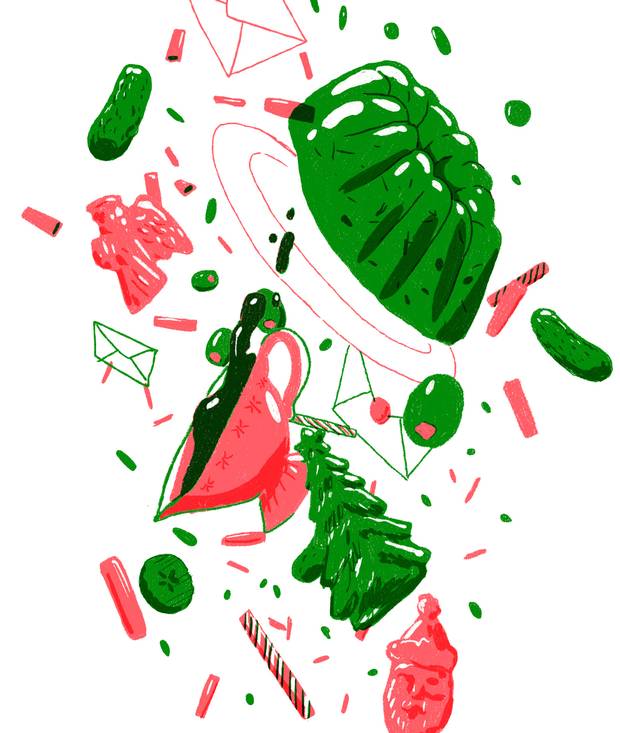First Person is a daily personal piece submitted by readers. Have a story to tell? See our guidelines at tgam.ca/essayguide.
I know little of my family origins from places outside our Canadian borders. There are no long-told tales of when Grandma or Great Grandpa had come over by boat from some foreign land, although they must have at some point. Based on the foods that grace our holiday table every year, I would say that we were firmly rooted in Anglo-Saxon Maritime Culture. Growing up in Toronto, however, we waited eagerly for a delivery – the annual supply of a few key items that were a prerequisite for a proper holiday.
Naturally, at Christmas we indulged in the standard turkey, ham, mashed potatoes and a myriad of root vegetables. I'm not sure which ancestor contributed the jellied salad, but it was always served alongside the rest of the Yuletide feast. Bright, lime green and filled with shredded cabbage and carrots, it jiggled in the crystal bowl as it made its way around the table. No one ate much of it, but each year it reappeared just like Jacob Marley's ghost.
The table was also never complete without the pickle dish. It was my job to fill it with an assortment of almond-stuffed olives, sweet, tiny gherkins and homemade bread and butter pickles. I would carefully hand it off to my little brother Mike, who would reverently place it next to the cranberry sauce in the middle of the table. Our parents would spend the next hour trying to shoo Mike away from the pickle dish before he emptied it. He was sneaky, though, a top-up was usually required before everyone sat down.
There were other delicacies that, while they may have had no distinctive link to our heritage, they were certainly long-held family traditions. In November, Gram would toddle off to the liquor store and buy two bottles of what was labelled vodka, but could easily have been paint stripper. Each would be emptied into a separate decanter on the sideboard. Into one she would add a bottle of cherry brandy and to the other a bottle of crème de menthe. They would be left to "cure" until Christmas Eve, when the stoppers would be removed. Gram would get out the hand-painted liqueur glasses that matched the decanters and everyone would sample that year's vintage. As youngsters, we would only be allowed a tiny sip and it wasn't long until all the relatives were sporting rosy cheeks.
But it was my mother's Maritime roots – and the foods that represent it – that we looked forward to. Each year, just a few weeks before Christmas, a package from Moncton, N.B., arrived from my maternal grandmother. It always included Christmas cards for my brother and I, which held a crisp $5 bill (a King's ransom in the 1960s) and greetings from a woman that we had only met a handful of times.
There was also a variety of barley toys. More treat than toy, these candies were shaped like Santa Claus, angels or snowmen. Made of barley water and copious amounts of sugar, they dissolved at a glacial pace. No matter how long you kept them in your mouth, they went on for days. Literally. They would be wrapped in waxed paper, placed in the fridge and removed the next day to savour again. I am pretty sure I made one angel last for the entire month of December.
There was hard ribbon candy – bright strips of red, green and white – that looked like bows on a Christmas box. And, as always, we would find a small bag of that Maritime oddity known as "chicken bones." The pink, satiny candies have a faint cinnamon taste and a thin chocolate filling. Made only in New Brunswick, they were a special treat for Mom.
Clippings from The Moncton Times & Transcript were also in the box – scraps of paper that chronicled the births, deaths and other events in the place my mother had left behind. I would read them eagerly, even though I did not know any of the players. I had very little first-hand knowledge of my mother's birthplace, so this helped me feel a bit of a connection. Many of the recipes that my mother passed along to me came from these clippings and I still have several of these yellow, brittle pages in my recipe file. Each year I bring them out and relive the excitement I felt as an eight-year-old as the first aromatic waves of spicy gingersnaps waft from my oven.
The centrepiece of the delivery, however, was nestled in amongst the barley toys and newsprint: a small packet of summer savoury sent from Summerside, PEI. This cellophane-wrapped bundle held the key ingredient for our turkey stuffing. An earthy, woody herb, it would be chopped finely and added to the mashed potato, stale bread and onions packed inside the enormous bird on Christmas Day.
Mom's East Coast seasoned stuffing was key, but it had to earn its place. Over the years, I have determined that the recipe for turkey stuffing must be one of the first negotiated battlegrounds in a marriage. I am sure there are more tears shed here than during the chopping of the onions as young newlyweds choose the family stuffing that will grace holiday celebrations for years to come. Will it be a sausage and bread base? Will it be rice and fruit? Will it be his family recipe or hers? At our house, Mom's summer-savoury stuffing was the winner. When Dad's side of the family visited, their editorial comment on the stuffing was there for all to see when we scraped the plates before washing.
Our holiday table was a blend of traditions and an acceptance of others. But mostly, Christmas came to us from Moncton, in a box delivered by Canada Post.
Patricia Williams lives in Ottawa.
